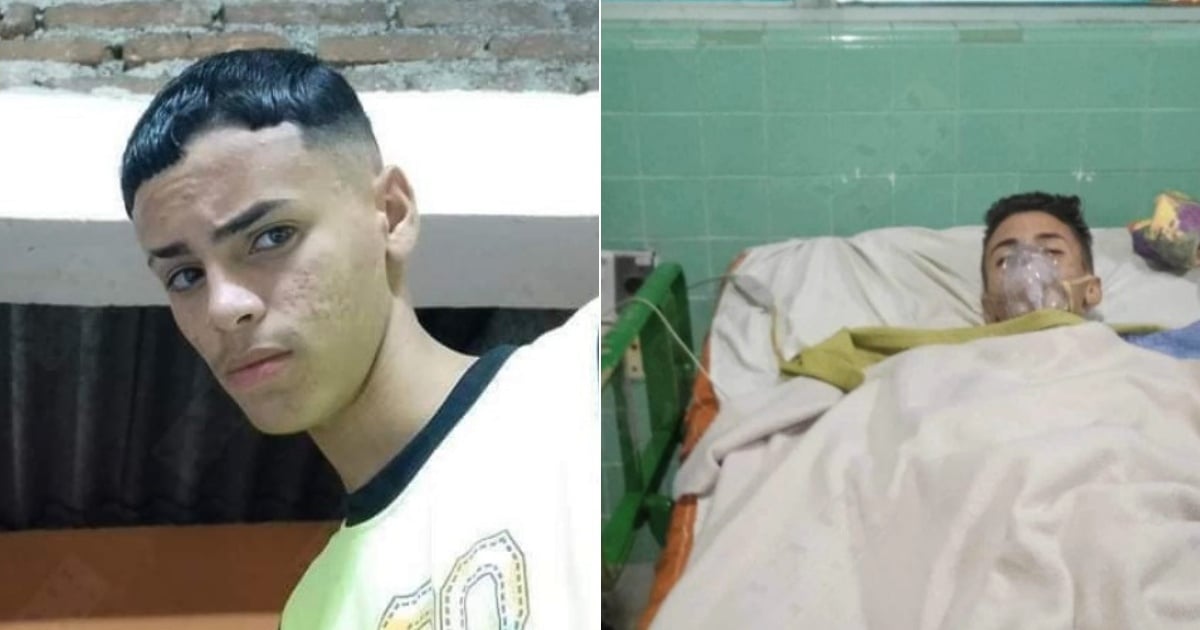
Héctor Eduardo Tamayo Burgos, a 17-year-old teenager who was hospitalized in Santiago de Cuba without a clear diagnosis of his illness, has passed away, as updated a few hours ago by journalist Yosmany Mayeta citing family sources.
The teenager was hospitalized for more than a week at the Dr. Antonio María Béguez César South Children's Hospital, better known as "La Colonia".
Tamayo Burgos was admitted without any diagnosis, but after our publication, the doctors intervened in the Intensive Care Unit, and the relatives were informed that the young man had a 'brain infection,'” added the communicator in reference to a previous report of the case.
The minor, who was in eleventh grade, lived with his father in the Luis Dagnes neighborhood, in the Altamira People's Council, as his mother is in prison.
In the comments section of the post, hundreds of Internet users expressed their dismay at the death of the teenager, who was known as "Tito" by his loved ones.
Until the closing of this note, there are no further details about the circumstances of the death of Héctor Eduardo Tamayo, nor about the illness he had.
Cuban activist Irma Broek, whose sister died in Camagüey last April, in that case due to alleged medical negligence, lamented the death of the teenager in a Facebook post and reiterated that the public healthcare system in Cuba is on the brink of collapse.
"Another victim of Cuban medical impotence! How many days this child fought to stay alive! How is it possible that the doctors couldn't identify the origin of his illness to treat it properly? Why was he kept in a regular room instead of being in intensive care until his desperate family decided to make it public, hoping that the pressure would make them work and save the boy?" questioned the activist based in Germany.
It is no secret to anyone the poor or almost non-existent attention that currently exists in our Hospitals; on one hand, the lack of supplies and on the other, the lack of empathy and commitment from healthcare professionals, and I say this last part with total firmness," he added.
Broek asserted that the majority of doctors pay attention to their patients in Cuba when it is already too late.
The activist added that there are several causes that lead to encephalitis, which seems to have been the final diagnosis in the case of the teenager, which may have been triggered by "a viral infection, an autoimmune inflammation, a bacterial infection, or by insect bites, as well as ticks or mosquitoes."
"How difficult was it to find a diagnosis for this child? Unbelievable. Until when and how many more?" he concluded.
In a previous report, Yosmany Mayeta indicated that Tamayo Burgos had initially been admitted to a "Miscellaneous" room in the hospital due to the lack of beds in the intensive care unit, until they were transferred to the critical care unit, where he remained in a vegetative state, receiving oxygen and other life support.
The sad passing of the teenager, only 17 years old, takes place amidst a complex health situation in Santiago de Cuba, which is currently facing a challenging epidemiological situation with the confirmation of the circulation of four viruses: dengue, influenza, oropouche, and SARS-CoV-2, the latter being the cause of COVID-19, as alerted by official sources last Wednesday.
Aris Batalla, representative of the Red Cross in Santiago de Cuba, warned on Facebook that the presence of these viruses puts the population at risk, which must take extreme preventive measures in the middle of an extreme shortage of medications such as painkillers and antipyretics.
At the same time, the National Director of Epidemiology of the Ministry of Public Health (MINSAP), Francisco Durán, acknowledged that the country does not have fuel to fumigate against mosquitoes, amid an increasing presence of the Oropouche Virus in Cuba.
In that context, it emerged yesterday that the provincial hospital Saturnino Lora in Santiago de Cuba is collapsed, without beds or resources, to attend to the growing influx of patients.
What do you think?
COMMENTFiled under: